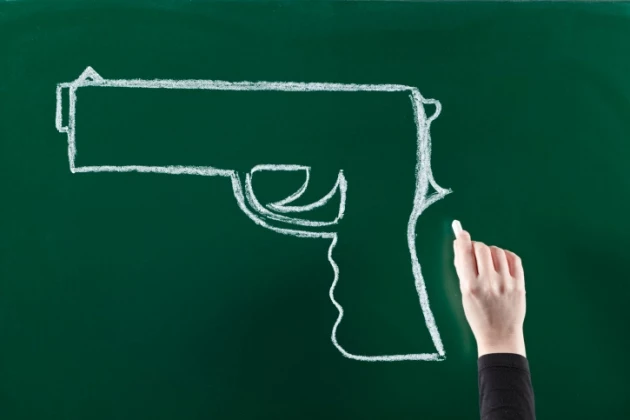
During a national town hall meeting on guns in January, President Obama was confronted by a survivor of rape for his stance on gun control. Kimberley Corban, now a mother of two, argued that the gun restrictions proposed by the Obama administration would prevent families from being able to protect themselves. She contended that it is her “basic responsibility as a parent” and as a survivor to carry a gun so that she and her children would not be victimized again.
This is not the first time that a survivor has come forward in favor of the gun lobby. In 2007 a student from the University of Nevada claimed that “had she been carrying her licensed gun, she would have averted the attack” that happened to her on campus. Unfortunately, we know that this is probably not the case. Many survivors find that their sense of safety is shaken after being assaulted, and it is understandable why an ethos of armed protection could be appealing for someone seeking safety after trauma. However, we believe that survivors deserve to know about all of the ways that their safety may be further compromised by this approach so they can base their decisions on what is known to be true, rather than on inflammatory rhetoric designed increase their anxiety and boost gun sales.
The assumption that guns can prevent violence is dangerous and reflects a serious misunderstanding in the media about rape and prevention strategy. Many experts in the anti-violence field have agreed that having a gun only increases your risk of violence. A 1998 study on guns and self-defense found that women who live in a household with a gun are more likely to be killed in their homes than those who do not. Furthermore, using a gun successfully for self-defense is a very rare occurrence. Despite the 300 million guns Americans are estimated to own, a 2012 study found that for every justifiable homicide with a gun, there are another 32 criminal homicides with a gun. Of the justifiable cases of homicide found that year, only 7.7% were committed by women. These numbers don’t even include the numbers of accidental shootings and suicides that take place each year, but taken altogether, these stats reflect a reality that guns usually only make things worse.
So who is pushing the agenda that women need guns to prevent rape? Since 1980, the NRA has targeted women in an effort to combat declining handgun sales. They advertise and rely on the rape myth that women should be scared of strangers, and that only with a gun can a woman protect herself. We now know that these assumptions are simply not supported by fact. It is far more likely for an intimate acquaintance or family member to endanger a woman’s life than a stranger. In fact, just having access to a gun increases a woman’s risk of intimate partner violence by five times. Furthermore, research shows that “more than three times as many women are shot by their husbands or intimate partners than are killed by strangers’ guns, knives or other weapons combined.” So when women buy guns to protect themselves from strangers, they are often giving gun access to people who are more likely to hurt them. Furthermore, in the face of an attack, a victim of sexual violence is unlikely to have a firearm immediately available or be willing to use it against a partner, friend, or family member, even if that person assaults them.
Now the gun lobby has a new target audience. In response to the media circus around campus sexual assault and the unending stream of mass shootings, some advocates have taken an interest in arming students. In proposing a bill allowing guns on campus in 2015, Nevadan Assemblywoman Michele Fiore said, “If these young, hot little girls on campus have a firearm, I wonder how many men will want to assault them… once these sexual predators get a bullet in their head.” This statement has a lot of flaws. First of all, calling women “hot little girls” does nothing to promote their agency and only infantilizes them. Secondly, once we allow guns on campus we can’t guarantee that the perpetrator won’t have one as well. Research has found that in “the states where guns are allowed on campus – Utah and Colorado specifically – incidents of forcible rape have increased and at a rate higher than the national average.”
The presence of firearms is all the more risky when you consider the prevalence of alcohol and drugs on college campuses. Considering that most incidents of sexual violence involve the use of alcohol or drugs by both the perpetrator and the victim, adding guns to the mix could be devastating.
In conclusion, it is unlikely that having more guns – especially on a college campus – would decrease sexual violence. The assertion that guns would prevent violence reflects a basic misunderstanding of rape culture and sexual violence. Furthermore, by advocating for risk-reduction strategies like telling women to arm up if they want to avoid rape, we fail to look at the real problem. Our time would be better spent focusing on true primary prevention, not arguing about guns.
_
Gentry Hodnett is our Administrative Services Coordinator. She manages our office and provides integral staff support.
